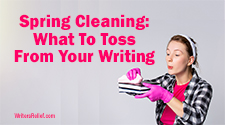
Every poet uses a cliché now and then—and in a first draft, that’s okay. But when you’re editing a poem that you hope to get published in a literary journal, you’ve got to be able to spot the common poetry clichés that so easily creep into contemporary poems. Some clichés are easy to see; others are not so obvious.
Typical Poetry Clichés In Contemporary Poems
Careless idioms. When most people think of clichés, they think of idioms—catchy, shorthand phrases that we all know and love because they make a point quickly. Some examples:
A bolt from the blue
Mad as a hornet’s nest
Straight as an arrow
Like the plague
Other clichés are a little sneakier. People phrase them in all sorts of ways, but the ideas behind them are all too familiar:
A heart full of sorrow
To the bottom of my soul
Gazing into my eyes
Lighting my soul/heart on fire
In poetry, idioms that are not placed with care will fail to resonate with readers. Most of the time, poets strive for surprising and attention-grabbing new ways to say familiar things—as opposed to leaning on stock phrases that we read so often we almost don’t notice them. Here’s a list of some common idioms that become poetic clichés.
One-word titles. Often, one-word titles are nouns like “garden” or “death” and they introduce poems about—guess what?—gardens or death. There is a place and time for one-word titles for sure. But there’s also a place and time to keep thinking until a better idea comes along.
Familiar poems about weather or landscapes. If you’re going to write nature poetry, be careful not to lean too hard on expected metaphors and similes. There are only so many ways to describe rain without running into clichéd ideas—unless you add an interesting, unexpected element.
ABAB rhyme schemes. Singsong rhyme schemes are a cliché of poetry that serves children well; ABAB rhyme teaches the concepts of meter and words that sound alike. But most editors and readers of modern adult poetry regard ABAB rhyme as overly simple and frequently unnecessary. Here’s how to know if you’re doing rhyme right.
Cliché scenarios. Children waiting to go downstairs on Christmas morning. Breakfast after a one-night stand. Holding the hand of a sick loved one while remembering something about him or her. Certain scenarios have become poetic clichés—in part because they are so inherently full of intense emotion and meaning. Today’s writers have to elevate familiar scenarios out of the realm of cliché. Learn more about clichéd scenarios.
Poems that sound “poemy.” In order to understand this type of poetic cliché, you have to know poetry really well. You’ve got to be reading it, writing it, living and breathing it (even if that’s a cliché in itself). Sometimes, a writer can rehash some familiar poetic tropes and arrange them to look like a poem on a page—double spacing, centering, and certain rhythmic cadences can appear to add gravity to lines that would otherwise not have much weight. You can learn more about today’s “fashionable gestures” and buzzwords that some people claim have become poetic clichés.
One Last Caveat About Avoiding Clichés In Poems
There is a time and place for using clichés—there are some idioms in this article that are efficient shorthand for making a point, so we’ve retained them in our final draft. The trick to using a cliché is to know you’re doing it and to know you’re doing it because it’s the right thing to do—not because you’ve given up on finding a better way.
QUESTION: What cliché phrase irks you most in a poem?





















I love the summary. What irks me(hmm…cliché)is the fear of clichés in poetry. I often read a poem, and the strained attempt at using different language becomes comical and sometimes painful. If I read azure sky one more time–it’s blue if you must describe it!:) Purposeful use of clichés are common in my poetry, for making an image more quickly in the reader’s mind and for the purpose of debunking the cliché(accepted use has falsely led to belief that most are fact when many are not)and for making a deeper point. In reality, all forms of traditional(traditional means cliché in a sense)poetry have become cliché. The difference between good poetry and run-of-the-mill(damn, I did it again!)are intelligence. One must learn to observe life intensely…and then absorb the(quite often, non verbal)answers received back from people and objects, constantly having to avoid the ego-urge of substituting one’s own. An interesting mind comes from concentration and meditation. Intelligence, most-time, is not a genius-gift from heaven—and can be developed in most everyone by practicing these tried-and-true(shit!–I’ll never learn))methods. Anyway, just my-two-cents-worth(ouch!)on the subject.
I looked up “cliches in poetry” for the purpose of CRAMMING as many as I could into one poem. It’s gonna be great.
Great tips. I’ve reviewed and edited thousands of poems by poets worldwide and think people write better if they focus on simple phrases, description, and story rather than flowery language, and make sure to remove words and phrases that are cliches.
Poems that casually rhyme
Have a purpose and place in our time.
An artist’s colors will tell,
When they compliment well,
What he has going on in his mind.
Un-rhyming is fine
Whether blank or just free
And not vulgar, but stick to the case.
Nothing is worse than confounding free verse
But, again, it’s a matter of taste.